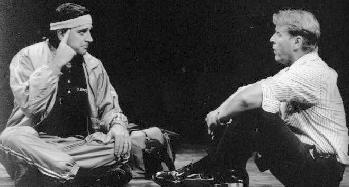SEARCH CurtainUp
TKTS
LETTERS TO EDITOR
REVIEWS
FEATURES
ADDRESS BOOKS
Broadway
Off-Broadway
DC
NEWS (Etcetera)
BOOKS and CDs
OTHER PLACES
Berkshires
DC (Washington)
London
Los Angeles
QUOTES
FILM
LINKS
MISCELLANEOUS
Free Updates
Masthead
Type too small?
NYC Weather
 Berkshire Review
Berkshire Review
Ciao!
|
I'm fifty-two yers old. That's not my life -- there must be more --- Arthur Allman, a circa 2001 Everyman asking a question he should have asked before fate dealt him an unwelcome double surprise. During the 1920's in France there were a group of artists who took part in what was called the Anonymous Movement. None would sign their work, all believed their canvas should speak for itself. . . I think the cut of personality they challenged has only gained strength today. . . the idea for Ciao! was sparked by the play Everyman (author: Anonymous). It seemed funny at first, then appropriate. --- Anonymous (from a letter to director Julianne Boyd). |

Michael Countryman as Rudolpho (one of his many roles) and David Rasche (Photo: Joe Schuyler)
|

|
The original Everyman's journey was not without humor, most of which was derived from his encounters with false friends and relatives who were quick to abandon him when they learned the end stop of his journey. Our 2001 Anonymous has dressed his fifty-two-year-old Everyman in a corporate suit and tie, with a constantly ringing cell phone in his pocket and given him the apt name of Arthur Allman.
The crisis in Allman's investment adviser career pales compared to the grim medical diagnosis that sends him on a desperate passage to circumvent his fate. His encounters with men and women who have passed through his life and now might help save it include: the time-pressed diagnosing doctor, a psychotherapist, his best friend and that friend 's, to his best friend's wife (with whom he has been having an affair), a woman running a spiritual healing center and a body builder at his health club.
Intermittently, the audience is also pulled in as the increasingly desperate Allman, who never looked at anyone's face very closely, is willing to listen to anyone who might dispense some words of wisdom. The last phase of Allman's journey -- the one that brings the long-delayed self-awareness -- features an encounter with an unknown donor and a fantastical reckoning with a Guardian Angel right out of It's a Wonderful Life. Not to be overlooked is Allman's ever on scene assistant (often as a voice-over), who, by beginning and ending all conversations with "Ciao", provides the play with its underlying metaphor that you leave the world the same way that you enter it.
All the men and women who cross Allman's path are rescued from stereotypes by the superb multi-role playing of Michael Countryman and Joanna Glushak. Their quick changes from persona to persona are the production's greatest strength. Countryman is especially wonderful as all the male others.
David Rasche who plays the central character deserves a medal for courage in venturing into the risky territory of breaking the fourth wall to enlist members of the audience in dialogue that, though carefully scripted, nevertheless requires the ability to deal with people who prove unresponsive or awkward in their unexpected roles as participants instead of viewers. The night I attended was something of a trial by fire with the people singled out stonewalling Mr. Rasche's questions. While Rasche handled the situation well, he lacks the experience of a Barry Humphries of Dame Edna fame. As for his portrayal generally, he's an attractive performer but he's trapped in a script that forces him to be more standup comic than questing Everyman. This is the second time I've seen Mr. Rasche doing his best to realize the promise of a new black comedy that is neither as new or as black as it needs to be (that other endeavor, Getting and Spending, opened on Broadway three years ago -- see link).
Besides the excellent cast, the play is well served by Julianne Boyd 's fast-paced direction and the designers -- Matthew Maraffi, Louisa Thompson, Jeff Crozier and Joe Jurachak. However, focusing the marketing effort on the novelty of an unidentified author skewers the very intent of that anonymity since, during the course of the page to stage process, the by-line actually became a more prominent story than the play itself. I do think that Mr. or Ms. Anonymous has a play that, with some additional work, could stand on its own -- without the mystery author gimmick.
LINKS TO OTHER SHOWS MENTIONED
Dame Edna and the Royal Tour
Getting and Spending
|
Ciao!
Written by Anonymous Directed by Julianne Boyd Cast: David Rasche(Arthur Allman), Michael Countryman (Man), Joanna Glushak (Woman) Set Design: Matthew Maraffi Costume Design: Louisa Thompson Lighting Design: Jeff Croiter Sound Design Joe Jurachak Fight Chreography: Tony Simotes Running Time: 90 minutes without intermission Barrington Stage, Consolati Performing Arts Center, Sheffield, MA (413/528-8888 Website 8/08/01-8/25/01; opening 8/11/01 Reviewed by Elyse Sommer based |





